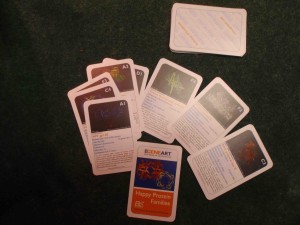Word on the street from Synthetic Biology 4.0.. take a word or leave a word.
- Venture capitalists and private investors are very interested in synthetic biology. Significant buzz in the Bay Area regarding the term. Large capital is required when making the transition from proven concept to, for example, a pilot plant for biofuel production. Venture capitalists love to get excited because it’s their job to both get themselves excited and get others excited (excited enough to give them loads of money).
- As on day2, a laboratory-proven “built from the ground up” organism (a thing, separate from other things, that eats, replicates, grows, and divides) may only be years away.
- Very innovative solution proposed to slow the rate of spreading HIV, using synthetic biology to create a “get-the-HIV-away” preventative medicine. Seemed very well received as a different track than current antiviral cures.
- No one really knows how to model cells or modified cells. (Again)
- An interesting group at Cal Tech has proposed a method of designing, or compiling the design by converting a hardware netlist into DNA sequences, combinatorial logic which has unique signal outputs, thus eliminating the cross-talk problem; theoretically modeled up to 1,000 gates, currently tested up to 4 gates.
- A cynical undergrad says that engineering biology will never work and will never be able to be modeled; though he has an iGEM project.
- A Hong Kong local university biology professor also mentions that engineering biology will never work; it is too unreasonable to expect biology to behave under known rules: “biology is not like that.”
- The word “never” in both cases might be very surprising to some, especially coming from two people in the field, one of whom has built Biobrick device(s).
- “DIY Bio is real! Bio can be done as a hobby! We want to let amateurs hack biology just like scientists do! We need to apply rules to make it non-biohazard, and then just do it.”
- Strongly contrasting opinion to the “it will never work” biologists.
- Cells can be made to change shape dramatically with specific (laser) light input. Very freakily amazing video.
- Which opinion is more correct, that engineering biology will work or that it doesn’t or where we fall as of right now?
- Drew Endy: “The truth is somewhere in the middle. Years ago, we had a lot of iGEM teams, and nothing worked. Last year, we had let’s say 100 iGEM teams, and 10 teams had working devices.” I conclude, the engineering process is improving through lab experience and raw data feedback. Engineers eventually make nearly anything work (just ask Scotty).
- Reshma Shetty (now at Ginko BioWorks): “It takes about 3 years to ‘get it’ [collect enough experience to be successful at creating biological devices]. Everyone seems to struggle until then.”
- More back & forth related to the licensing issues of an “open source” biological library.
- The Bay Area may have an accessible “Bio Fab Lab” in the years ahead, funded by public sources and aimed at improving the “open source” biological library.
- Even the venture capitalists and synthetic biology company owners get history wrong; mistakenly stating facts. “This is like the IBM PC architecture, completely open, and enabling things like the open source movement later”.. Wrong!; in fact, the IBM PC was completely locked down and very proprietary and backed by lawyers from the huge deep pockets of IBM — it was Compaq who, through a legal process of reverse engineering to work around the patent and intellectual property process, completely cloned the IBM PC firmware to a compatible version, thus inventing the clone-PC market (while IBM vehemently objected and litigated against). Please read the history books (I would suggest Hackers, by Steven Levy, as a starting point). Most of the “this is like open source with computers” analogies are.. well.. off by a factor of two. At least a factor of two.
All quotes above are not to be taken literally. Any resemblance to actual persons is entirely coincidental. The contents of this article and this web site (web log) are Copyright with All Rights Reserved. No content may be used without explicit written permission. (This is to prevent quoting out of context.)
For those who aren’t familiar with synthetic biology, I will quote the Synthetic Biology 4.0 web site:
What are the applications of Synthetic Biology?
BioEnergy. Cells are being engineered to consume agricultural products and produce liquid fuels. British Petroleum and the US DOE granted $650 million dollars for research in the San Francisco Bay Area.
Drug Production. Bacteria and yeast can be re-engineered for the low cost production of drugs. Examples include the anti-malarial drug Artemisinin and the cholesterol-lowering drug Lipitor.
Materials. Recombinant cells have been constructed that can build chemical precursors for the production of plastics and textiles, such as Bio-PDO and spider silk.
Medicine. Cells are being programmed for therapeutic purposes. Bacteria and T-cells can be rewired to circulate in the body and identify and treat diseased cells and tissues. One such research program is the NIH-funded Cell Propulsion Laboratory at UCSF.
Synthetic Biology is a new approach to engineering biology, with an emphasis on technologies to write DNA. Recent advances make the de novo chemical synthesis of long DNA polymers routine and precise. Foundational work, including the standardization of DNA-encoded parts and devices, enables them to be combined to create programs to control cells. With the development of this technology, there is a concurrent effort to address legal, social and ethical issues.
How is this different from genetic engineering?
Synthetic Biology builds on tools that have been developed over the last 30 years. Genetic engineering has focused on the use of molecular biology to build DNA (for example, cloning and PCR) and automated sequencing to read DNA. Synthetic Biology adds the automated synthesis of DNA, the setting of standards and the use of abstraction to simplify the design process.
